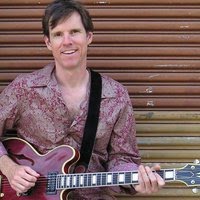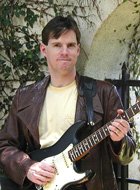Dear Barrett,
I'm using a Guitar Effects software and just wanted to know the meaning of a few terms -
Sir, what do the following terms / Knobs mean and do -
1. Presence
2. Filter
I've read many a times that to get a heavy metal sound (like Metallica's) one should scoop the Mids, Does this mean that we keep the Treble and Bass to the fullest and Mids knob to the full ? If yes then what will the Presence knob do ? I tried to figure it out but couldnt guess very well. If you could kindly advice regarding this, I'll be very grateful to you.
Hi.
Though your question is specifically about guitar effects software, the terms presence, filter, bass, mid, and treble would also apply to an amp and hardware effect units, which is how I tend to think.
A filter is a device that removes part of the audio signal. The tone knob on your guitar is a filter that removes high frequencies while allowing the low frequencies to pass through unchanged.
An equalizer (EQ) is a set of filters that control various frequency ranges. An equalizer with filters only is said to be passive. An active equalizer, on the other hand, can also boost selected frequencies using AC or battery power.
Some effects like wah wah pedals contain variable filters and/or boosters whereby you can actively control which frequencies you want to cut or boost, and the amount by which they are affected, in real time, or according to a programmed cyclical preset.
Though there is no law set by an authority, let's say any frequency below 300 Hz is bass, from 300Hz to 3kHz is midrange, and above 3Khz is treble.
Definitions for the "presence" range vary, but the idea is that it covers part of the treble range (perhaps 4 kHz to 6 kHz) that makes most instruments sound closer and more distinct. Boosting this area too much can make a sound that is irritating, especially when you start to play louder. On some amps, this knob is effectively disabled when the treble control is turned all the way up. The tone controls on many amps do not act completely independently.
The word "scoop" refers to the appearance of a graph of the audio signal. When the mid is "scooped" (like scooping ice cream out of a bucket with a spoon), there is a visible dip in the middle of the waveform. To get a scooped sound, turn down the mid.
Exaggeration of the scooped effect can result in a tone that sounds great at home or in the studio, but causes your guitar sound to disappear when you're playing with a live band.
Sculpting your tone is difficult at first because there is a natural tendency to want to use a visual numeric reference for the various knobs ("Kirk Hammett puts the treble on 7, so I will too"), but really, this won't work. All amps, guitars, microphones, rooms, PAs, and stage setups are different. Ideally you should set the knobs with your eyes closed (and your ears open!), then go stand as far away from your amp as far as your cables will permit. Play with the band, then walk back to the amp and make any adjustments; then run out into the front and repeat the process.
Often there's no time for this, so you should err on the side of caution and keep the tone and volume knobs in a conservative range, just making sure that the snare drum and vocals are louder than your guitar and that you can hear everything else clearly. Notice I did not mention that you should be able to hear yourself. If you can't hear your own playing, sometimes it's because you are standing in the wrong place or you are unaccustomed to the situation.
Avoid cranking up the amp to the annoyance of other players or the audience just so you can hear every detail of your playing as you are used to at home. If you have a sound system, practice with loud backing tracks so you can get used to hearing how your guitar contributes mostly its fundamental pitches and percussive attacks, while some of the details are (rightly) covered up by the other instruments.
Though you should try to get close to your desired sound with your amp, guitar, and fingers, you will never sound exactly like a CD that you want to emulate unless you have the same: pedals, cables, mics, preamps, compressors, equalizers, convertors, clocks, effects, plugins, mixing and mastering software, monitors, ears, experience, etc. etc. Every link in the audio chain has a drastic effect on the end result.
In some cases there is nothing you can do but experiment with different equipment and settings, but personally that is something I enjoy. With that in mind, whenever possible I try to buy only quality equipment that I can sell later if it turns out to be wrong for me. I've gotten stuck with some items like cheap guitars and effects that are impossible to get rid of. Other things, like major-brand tube amps and quality microphones, people buy instantly. These things hold value and sometimes go up. So oddly enough, buying an expensive analog hardware item (amp, guitar, pedal, mic, preamp) can sometimes save you money because a) you'll usually not have to waste time replacing it, and b) if you do, you can get most of the money back by selling it.
A last word about tone: In all cases the overall volume level of the band and the individual instrument has to be taken into consideration, as well the relative mix and the frequencies emphasized by the other instruments. A good engineer will craft an overall mix that makes all instruments heard and sound good, sometimes selectively filtering parts of one instrument's sound to make room for important parts of another. That's why band members should usually not participate in a mixing session unless they are quite experienced. They expect to hear themselves louder because they are closer to their own instrument than any other when they play. They also don't want part of their signal to be cut out, even though it is necessary to make it fit into the mix.
Sorry to ramble on about it. The short answer is, the louder you're playing, the less EQ compensation you need. When playing quietly at home by yourself, it'll probably sound good to do what you suggest: crank up the treble and bass, scoop the mids, and turn the presence up pretty high.
Thanks, Barrett


No comments:
Post a Comment